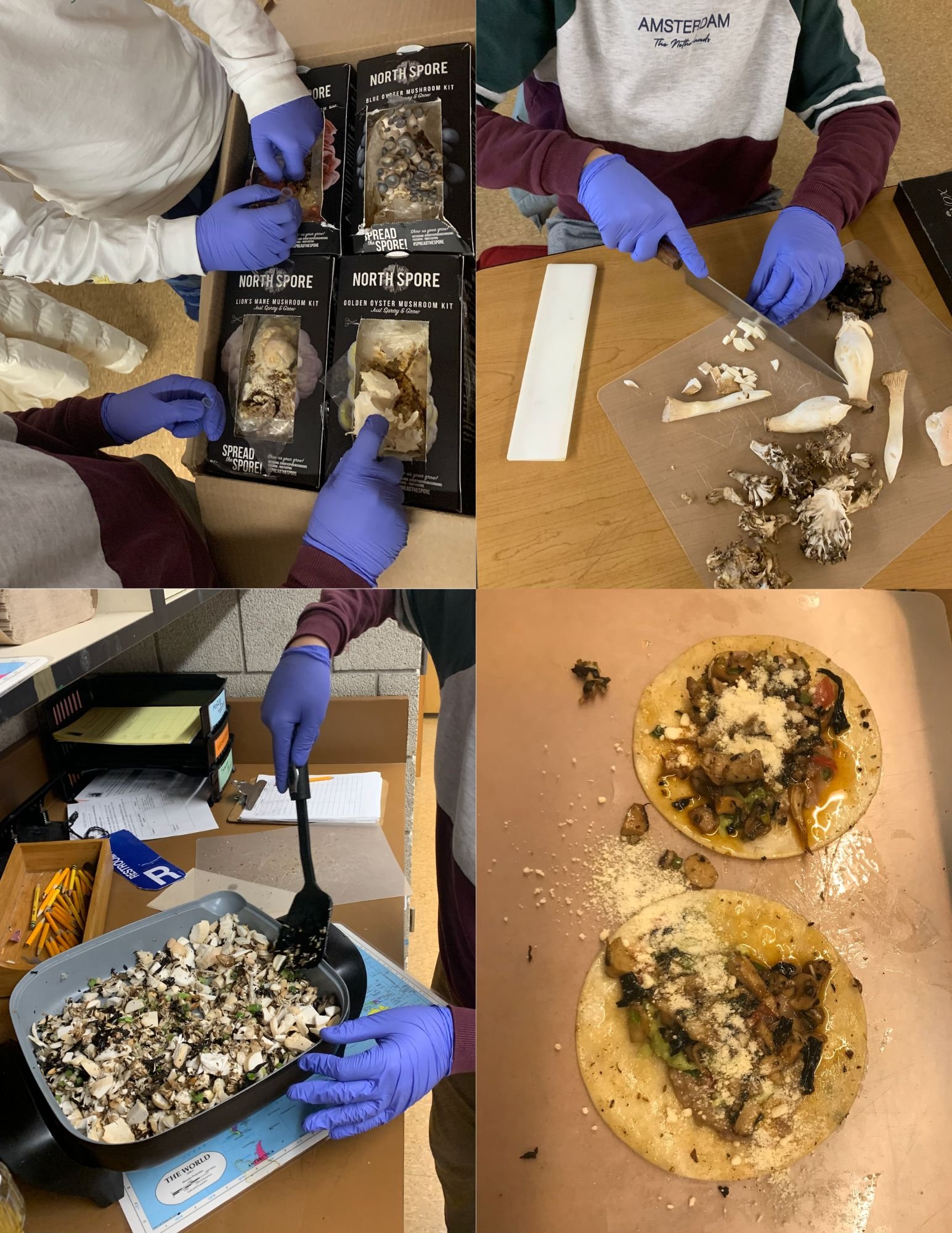Inspiring Awe Using Mushrooms in the Classrooms
Krity Gurung, Development & Communications Coordinator
Michael Hume, Youth Education Coordinator
Disclaimer: Although our love for mushrooms go beyond the classrooms and kitchen, we know it’s important to understand the dangers of foraging and consuming mushrooms if you don’t have robust education on identifying mushrooms or are not with someone who does. Please do not eat any wild mushrooms that you see, unless 100% certain of its identification. Please find links at the bottom for more information and resources on mushroom foraging and the dangers that come with it.
Here at CitySprouts, not a day goes by where mushrooms aren’t the topic of conversation. Whether you find them in the kitchen, the garden, the hiking trail, the grocery store, or the classroom, there’s always more to discover about the versatility and power of these fungi.
Here’s how we use them to teach science at our Boston and Cambridge Public Schools (and hopefully raise a community of future mushroom enthusiasts):
For one thing, we firmly believe that while not all mushrooms are edible, the ones that are edible should never go to waste. With safe and easy to use North Spore Mushroom Grow Kits, we’re able to grow, take care of, observe, harvest, and cook delicious mushroom dishes all within a few weeks. In our after school Young Leaders Program, our students take part in a hands-on experience that consists of growing their own mushrooms to then prepare into a meal, all from start to finish (under direct adult supervision and education about the dangers of mushrooms). The students learn to make mushroom tacos, raviolis, and even dried mushroom jerky. As they improve upon their cooking skills, they are also encouraged out of their comfort zone and learn what it takes to grow their own ingredients from scratch.
Our Young Leaders Program also had the chance to go on a mushroom foraging field trip with Tyler from The Mushroom Shop. Photos from the field trip can be found on our Instagram.
Even though the most exciting part of using mushroom grow kits are the delicious meals we get to prepare together, mushrooms also serve as the perfect tool for teaching science through observation. Students get to explore the various types of shapes, tastes, smells, textures, sizes, colors and purpose of these beautiful fungi that grow on our planet (and boxes). By being able to distinguish and identify different types of mushrooms through sensory workshops, matching/concentration board games, and by crafting models that mimic the various fruits of fungi, important questions and explorations are raised by students such as: are mushrooms living? Non-living? Plants? Animals? Poisonous? Edible? Medicinal? What purpose do they serve?
Which brings us to - what would the world look like without mushrooms? For starters, our forests, alongside other wooded areas, would be completely overrun with deceased and decaying organic matter piled to astounding heights. Mushrooms are one of the world's most active and productive decomposers, helping to maintain balance within our ecosystems. As decomposers they are invaluable in the nutrient cycle, consuming and replenishing, all while providing the forest and other smaller plants with a communication network. Mushrooms being the fruit of the fungi and mycelium (the vegetative part of a fungus) being the root structure, as the fungi grows, the mycelial network serves as a biochemical pathway for plants to communicate with each other across different plant species. In addition to being an information highway for organisms, their networks also provide increased access to water and minerals for their plant friends, consuming the carbohydrates produced by the plants in return. In recent years, it was also discovered that mushrooms are capable of consuming and breaking down PCB’s, an organic environmental pollutant, while also having the ability to clean up oil spills.
Undoubtedly, it is safe to say that mushrooms and the greater fungi family play a vital role in our varying ecosystems. They act as environmental clean up crews, information highways, recyclers, delicious nutrients as food, healers through their medicinal properties, and a crucial learning tool for students. And we provide them what exactly? So, whether you are already a mushroom enthusiast or someone who has adamantly stayed away and labeled them “gross,” it is our responsibility to continue expanding our curiosity and appreciation and let these wonderful fungi into our lives because after all…there’s always room for mush-room.
A few helpful resources we always go back to:
Connect with us on Instagram/Facebook/LinkedIn to stay up to date on our mushroom journey.



